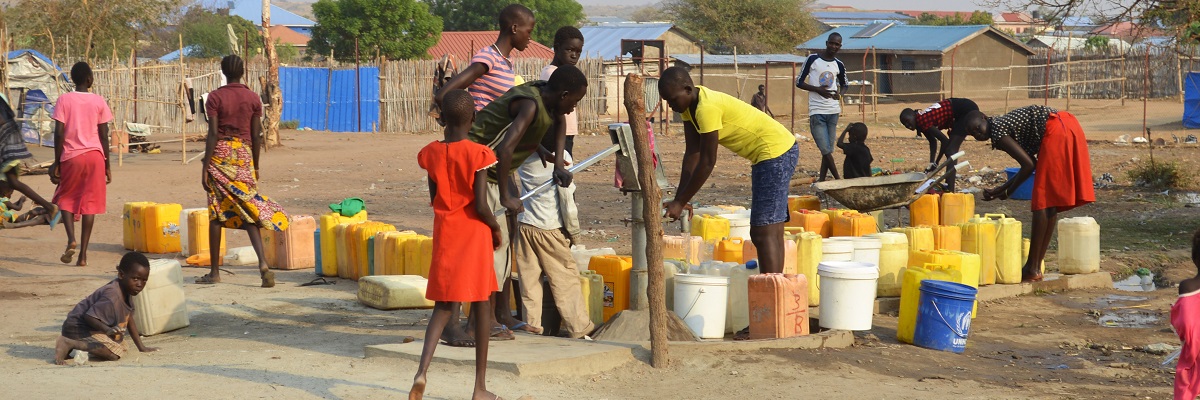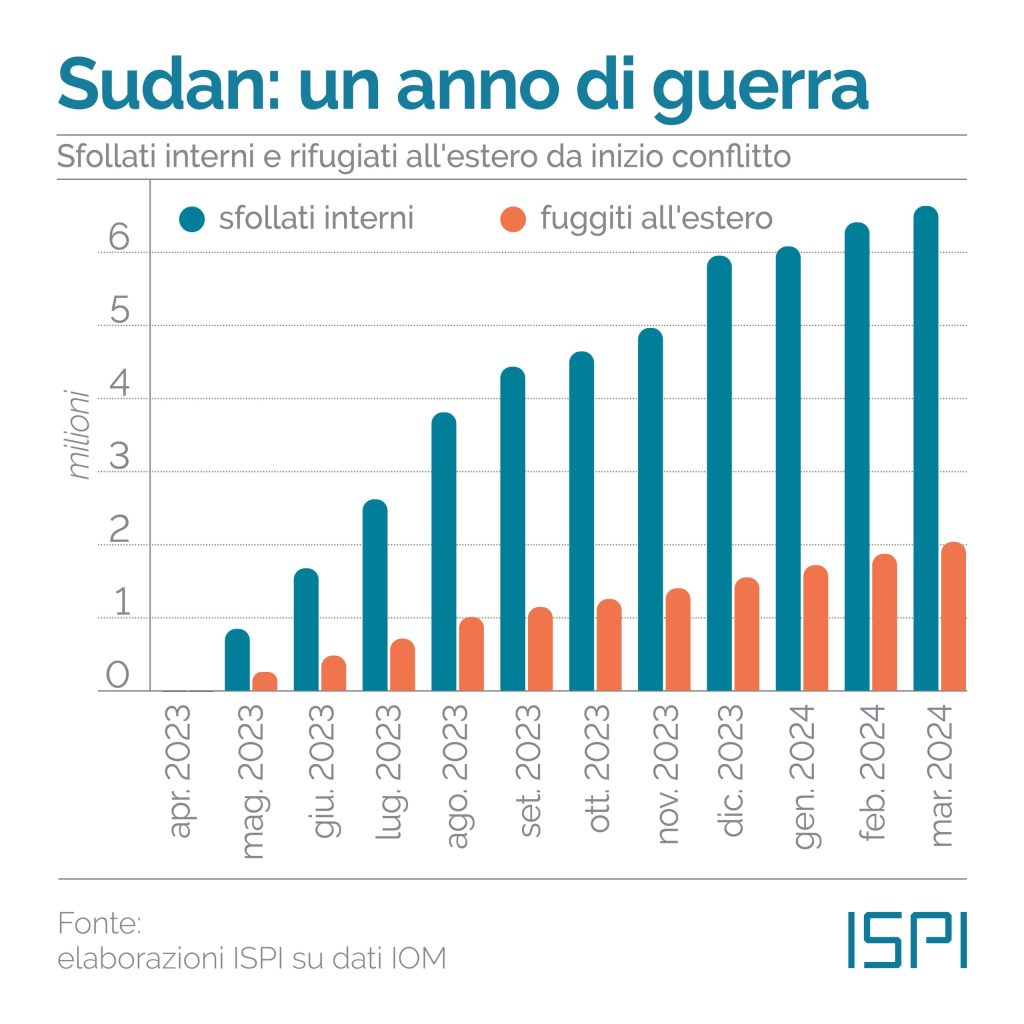Defense & Security
Sudan and the "ghost war"

Image Source : Shutterstock
Subscribe to our weekly newsletters for free
If you want to subscribe to World & New World Newsletter, please enter
your e-mail
Defense & Security

Image Source : Shutterstock
First Published in: Apr.16,2024
Jul.15, 2024
After a year of civil war, Sudan is turning into a failed state. Humanitarian organizations on the ground are sounding the alarm on the first anniversary of the onset of violence. 'In the past year, I have seen my country descend into violence, madness, and destruction,' – said Elsadig Elnour, director of Islamic Relief for Sudan – 'amid the indifference of the rest of the world.' According to Doctors Without Borders, the country is facing a dramatic humanitarian crisis, with over 8.4 million people, about 16% of the population, including 2 million children under 5 years old, forced to flee within the country or across the border, and it is on the brink of mass famine. The conflict, a power struggle between the Sudanese Armed Forces (SAF) led by General Abdel Fattah al-Burhan and the paramilitaries of the Rapid Support Forces (RSF) commanded by Muhammad Hamdan Dagalo, a warlord known as Hemedti, has already caused more than 14,600 casualties, according to the United Nations. However, the humanitarian response has tragically remained inadequate: only 5% of the funds requested have been allocated, making an already critical situation desperate, where Sudanese authorities systematically block the delivery of aid in some areas, while the RSF loot health facilities and supplies. The United Nations High Commissioner for Human Rights, Volker Türk, has warned the international community of the likelihood of further escalation of violence 'as the parties to the conflict arm civilians' – he explained – ‘and more and more armed groups join the fighting'.

Despite humanitarian alarms, Sudan remains almost entirely absent from the news and global debate, both focused on the wars in Gaza and Ukraine: so far, international donors have allocated almost a thousand times more aid to Kiev than to Khartoum. To break the 'wall of silence' and reverse this trend, France organized an international conference in Paris that raised two billion euros. But it was precisely from the French capital that the director of Save the Children, Dr. Arif Noor, highlighted the shortcomings of international commitment: 'In the first 100 days of 2024' – Noor said – 'the amount of money raised for the humanitarian crisis in Sudan was less than a fifth of the funds allocated in just two days to rebuild Notre Dame Cathedral’. Noor has defined it as 'shocking to note that, after a fire in which no one died, donors have been so generous in funding the restoration of the Cathedral, while 14 million children are left to fend for themselves as war rages in the country, hunger and diseases increase, and schools have been closed for over a year.' Noor and other operators have urged world leaders to work directly with the warring parties to ensure respect for international law, in the context of a conflict characterized by widespread and documented violations against the civilian population, mutilations, and rapes, especially of young people.
On April 15, 2023, after fighting erupted in the capital Khartoum and violence quickly spread to western Darfur, some observers still hoped that the conflict could be contained. Optimists hoped that, as in previous wars in Sudan, the two parties would quickly reach a stalemate and reach a power-sharing agreement. A year later, we can say that the war has taken a completely different turn, fracturing into a myriad of local conflicts affecting various of the 18 provinces into which the country is divided, and intertwining in the country's complex ethnic mosaic, ultimately involving various militias and rebel groups, along with their foreign supporters. Currently, weapons and militias pour into Sudan from the borders with Chad, Libya, and the Central African Republic, and through the Red Sea. According to various sources, mercenaries from Russia and Ukraine now support one militia or another, while competition for access to land and underground resources fuels the violence. And since neither of the warring parties can deliver the decisive blow, both the SAF and the RSF have begun to 'lose pieces,' creating rebel subgroups that in turn operate according to different agendas and interests. In this scenario, no one currently seems capable of restoring control over the entire Sudanese territory. 'We are plunging towards a failed state', observes Tom Perriello, American special envoy for Sudan, while after a year of war, the country witnesses the massive militarization of local communities, a dynamic that is unlikely to be reversed in the short term.
The country engulfed in violence also faces the risk of famine: according to the latest report from the Integrated Food Security Phase Classification (IPC), acute malnutrition will affect most of the country by June, killing half a million people. In the 'extreme' scenario predicted by the Clingendael Institute, up to a million people could die. Due to the war, much of Sudan, especially Darfur, did not yield crops in 2023. Grain production has plummeted while the price of basic food items has increased by up to 88%. These forecasts are expected to worsen as the fighting has now reached the country's 'granary,' the State of Gezira, and although the UN has yet to officially declare famine, few doubt that it is already underway in some parts of Sudan. Further complicating the situation is the fact that, except for a few dozen trucks transported with great difficulty, humanitarian aid does not reach conflict zones. International organizations have reported multiple obstacles, as well as the armed groups' desire to control everything entering and leaving areas under their control by improperly appropriating supplies to resell them on the black market. Currently, hopes that something will intervene to save the country from the abyss it is sinking into are minimal and are directed towards Cairo, where ceasefire talks are ongoing. A separate negotiation, supported by the United States, is expected to resume soon in Saudi Arabia, but a date has not yet been announced.
The comment by Lucia Ragazzi, ISPI Africa Program "After the initial weeks since its dramatic beginning in April 2023, the war in Sudan suffered from low priority in the international agenda. However, its consequences continued to manifest in the country and neighboring countries with dramatic intensity. On the one-year anniversary of the war's start, the international conference in Paris has rekindled attention on this serious conflict, taking a step forward to address the severe funding shortfall needed to address the crisis. Increased aid is crucial for a conflict that has already generated the most severe refugee and displacement crisis in the world, risking also becoming the largest food emergency. But, as highlighted by United Nations Secretary-General Antonio Guterres, 'beyond global support for aid, there is a need for concerted and global push for a ceasefire, followed by a peace process.'"First published in :

Alessia de Luca is a professional Journalist and an expert of Middle East and US politics, in charge of the daily newsletter ISPI Daily Focus and of the Focus USA2024. She has served as Middle East and Northern Africa correspondent from 2005 to 2009.
Unlock articles by signing up or logging in.
Become a member for unrestricted reading!